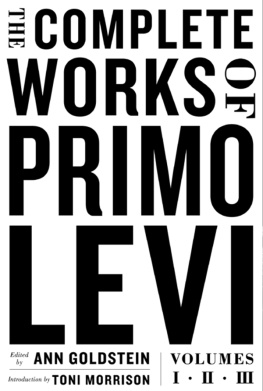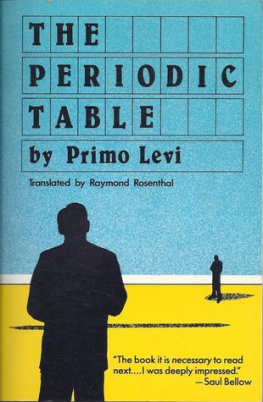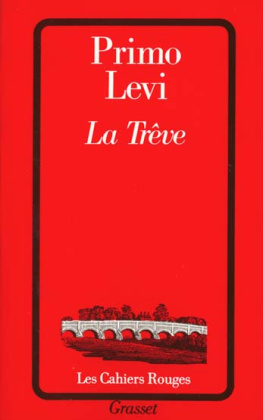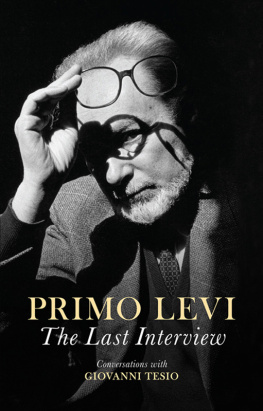
The Complete Works of
Primo Levi

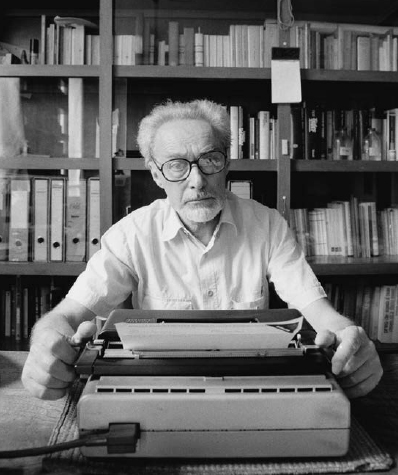
This book has been published with a translation grant awarded by the
Italian Ministry of Foreign Affairs.
Published by arrangement with Giulio Einaudi Editore
Copyright 2015 by Liveright Publishing Corporation
Introduction copyright 2015 by Toni Morrison
Translators Afterword by Stuart Woolf copyright 2015 by Stuart Woolf
Primo Levi in America copyright 2015 by Robert Weil
Chronology, maps of places relevant to Primo Levi in Turin and Piedmont,
The Publication of Primo Levis Works in the World, Notes on the Texts,
and Select Bibliography copyright 2014 by Centro Internazionale
di Studi Primo Levi, Torino, Italy. All rights reserved.
All rights reserved
If This Is a Man by Primo Levi, translated by Stuart Woolf. Copyright 1958 by Giulio
Einaudi Editore s.p.a. Published by arrangement with Viking Penguin,
an imprint of Penguin Publishing Group, a division of Penguin Random House LLC.
Frontispiece photograph copyright by Gianni Giansanti / Sygma/Corbis
Since this page cannot legibly accomodate all the copyright notices, pages 28992901
constitute an extension of the copyright page.
For information about permission to reproduce selections from this book,
write to Permissions, Liveright Publishing Corporation,
a division of W. W. Norton & Company, Inc.,
500 Fifth Avenue, New York, NY 10110
For information about special discounts for bulk purchases, please contact
W. W. Norton Special Sales at specialsales@wwnorton.com or 800-233-4830
Book design by Ellen Cipriano
Production manager: Anna Oler
ISBN 978-0-87140-456-5
ISBN 978-1-63149-206-8 (e-book)
Liveright Publishing Corporation
500 Fifth Avenue, New York, N.Y. 10110
www.wwnorton.com
W. W. Norton & Company Ltd.
Castle House, 75/76 Wells Street, London W1T 3QT
CONTENTS

Introduction
Toni Morrison
Editors Introduction
Ann Goldstein
Chronology
Ernesto Ferrero
1.IF THIS IS A MAN
Translated by Stuart Woolf
2.THE TRUCE
Translated by Ann Goldstein
3.NATURAL HISTORIES
Translated by Jenny McPhee
4.FLAW OF FORM
Translated by Jenny McPhee
5.THE PERIODIC TABLE
Translated by Ann Goldstein
6.THE WRENCH
Translated by Nathaniel Rich
7.UNCOLLECTED STORIES AND ESSAYS: 19491980
Translated by Alessandra Bastagli and Francesco Bastagli
8.LILITH AND OTHER STORIES
Translated by Ann Goldstein
9.IF NOT NOW, WHEN?
Translated by Antony Shugaar
10.COLLECTED POEMS
Translated by Jonathan Galassi
11.OTHER PEOPLES TRADES
Translated by Antony Shugaar
12.STORIES AND ESSAYS
Translated by Anne Milano Appel
13.THE DROWNED AND THE SAVED
Translated by Michael F. Moore
14.UNCOLLECTED STORIES AND ESSAYS: 19811987
Translated by Alessandra Bastagli and Francesco Bastagli
Primo Levi in America
Robert Weil
The Publication of Primo Levis Works in the World
Monica Quirico
Notes on the Texts
Domenico Scarpa
Select Bibliography
Domenico Scarpa
T he Complete Works of Primo Levi is far more than a welcome opportunity to reevaluate and reexamine historical and contemporary plagues of systematic necrology; it becomes a brilliant deconstruction of malign forces. The triumph of human identity and worth over the pathology of human destruction glows virtually everywhere in Levis writing. For a number of reasons his works are singular amid the wealth of Holocaust literature.
First, for me, is his languageinfused as it is with references to and intimate knowledge of ancient and modern sources of philosophy, poetry, and the figurative uses of scientific knowledge. Virgil, Homer, Eliot, Dante, Rilke play useful roles in his efforts to understand the life he lived in the concentration camp, as does his deep knowledge of science. Everything Levi knows he puts to use. Ungraspable as the necrotic impulse is, the necessity to tell, to describe the monotonous horror of the mud, is vital as he speaks for and of the throngs who died in vain. Language is the gold he mines to counter the hopelessness of meaningful communication between prisoners and guards. A pointed example of that hopelessness is the exchange, recounted in If This Is a Man, between himself and a guard when he breaks off an icicle to soothe his thirst. The guard snatches it from his hand. When Levi asks Why? the guard answers, There is no why here. While the oppressors rely on sarcasm laced with cruelty, the prisoners employ looks, glances, facial expressions for clarity and meaning. Although photographs of troughs of corpses stun viewers with the scale of ruthlessness, it is language that seals and reclaims the singularity of human existence. Yet the response to visual images collapses before languageits stretch and depth can be more revelatory than the personal experience itself.
Everywhere in the language of this collection is the deliberate and sustained glorification of the human. Long after his eleven months in what he calls the Lager (Auschwitz III), as a survivor, Primo Levi understands evil as not only banal but unworthy of our insighteven of our intelligence, for it reveals nothing interesting or compelling about itself. It has merely size to solicit our attention and an alien stench to repel or impress us. For this articulate survivor, individual identity is supreme; efforts to drown identity inevitably become futile. He refuses to place cruel and witless slaughter on a pedestal of fascination or to locate in it any serious meaning. His primary focus is ethics.
His disdain for necrology is legend. Dwelling on memorieshis and othersof survival rather than on the monstrous detritus of suffering, he is compelled by how suffering is borne whatever its consequence. Time and time again we are moved by his narratives of how men refuse erasure.
Melancholy and sorrow often reside more in his poetry than in his prose. There we find insects, accusatory ghosts, and the sadness of place. In two of his poems, Song of the Crow I and Song of the Crow II, desolation is an inner reality monitored by a malevolent companion.
In the first, memory and sorrow are fixed and eternal.
Ive come from very far away
To bring bad news.
...............
To find your window,
To find your ear,
To bring you the sad news
To take the joy from your sleep,
To spoil your bread and wine,
To sit in your heart each evening.
The second Song of the Crow is even more resonant of despair.
What is the number of your days? Ive counted them:
Few and brief, and each one heavy with cares;
With anguish about the inevitable night,
When nothing saves you from yourself;
With fear of the dawn that follows,
With waiting for me, who wait for you,
With me who (hopeless, hopeless to escape!)
Will chase you to the ends of the earth,
Riding your horse,
Darkening the bridge of your ship
With my little black shadow,
Sitting at the table where you sit,
Certain guest at every haven,
Sure companion of your every rest.
Next page
